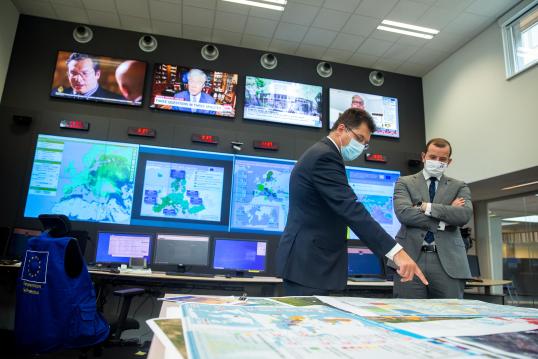Forest fires pose a significant disaster risk to the whole of Europe as well as to other parts of the world. They damage ecosystems, destroy woodlands and devastate the lives of many of our citizens. Over the past couple of years, fires have ravaged hundreds of forests and ruined thousands of protected sites across the length and breadth of the European Union. But amid worrying forecasts, 2021 may prove to be the most devastating yet.
Europe’s wildfires are getting steadily worse. Over the course of the past ten years, the EU’s Civil Protection Mechanism has responded to more than forty large-scale forest fire emergencies, with one out of every three requests for assistance going towards wildfire disasters. Climate change is also extending the forest fire season by several months, increasing the likelihood of more wildfire emergencies for European communities going forward. At the same time, the expansion of fire-areas northwards has created new vulnerabilities for many Member States, particularly Sweden, Finland and Denmark.
As European Commissioner for Crisis Management, I am determined to step up all efforts to strengthen our EU-wide response to forest fires this year and into the future. My utmost consideration goes towards minimising the risk that fires pose to the lives and livelihoods of our citizens. To do all this, we must act together now: to help prevent, prepare and respond to forest fire threats this year.
Firstly, prevention has to be the primary priority for us. Efficient resilience measures that reduce the risk of wildfires and other forest-related risks are our best bet for benefiting citizens and environment in the areas prone to the forest fires. To date, the EU has offered significant financial support to local communities to help develop prevention measures. And through our Copernicus Emergency Management Service, we continue to monitor risks in the field. But additional actions will be needed if we are to address growing forest fire threats this year. That is why, together with my colleague Commissioner Virginijus Sinkevičius, in charge of environment and oceans, we recently issued a number of practical guidelines on forest fire prevention, facilitating a better understanding on land-based prevention measures and responses. Our aim is to provide useful advice to all Member States ahead of this year’s forest fires season, specifically on good governance, proper planning, effective forest management and funding opportunities.
Secondly, preparedness is another key element for a swift and effective response operation, knowing that the danger cannot always be prevented. But preparedness takes time for all involved. Building reserves and capacities, for example, is an endeavour of many years. This is why anticipatory actions and foresight are so important, because they enable us to start preparing today for possible events tomorrow. In this regard, we are continuing to meet with national authorities to identify risks for this year’s forest fire season. We are also engaging with forest fire experts to assess preparedness levels at a regional and local level.
And thirdly, when wildfires occur, it is important that we respond in a timely manner. We need to stand ready to assist and offer support at a moment’s notice. Part of our response includes the rescEU firefighting fleet, ready to be deployed in times of critical emergencies and disasters. This complements existing resources located on the ground. And provides essential assistance to those living in the most vulnerable regions. For the 2021 forest fire season, our proposed fleet will consist of 17 aircrafts, including 11 aeroplanes and 6 helicopters. It will also be strategically positioned throughout the EU, to tackle fires across all corners of our Union. With these, we will be able to provide an extra layer of protection when fires spiral out of control. And we will be able to ensure that fires do not take the lives of more of our citizens this year.
Ahead of the 2021 forest fire season, we will again attempt to reduce the impact of fires on the environment. And to minimise the threat that wildfires pose to people’s lives and livelihoods. By working closely together at all levels, including through the EU’s Emergency Response Coordination Centre, we will be able to prevent, prepare and respond better to all large-scale forest fire events, both this year and into the future.
Details
- Publication date
- 21 June 2021
- Author
- Directorate-General for Communication

